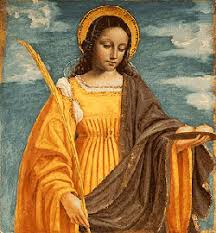Saint Agatha (+251) is counted amongst the most venerated of the ‘virgin martyrs’, one of the seven women whose name appears in the Canon of the Mass (that is, the first and longest ‘Eucharistic Prayer’ also called the Roman Canon, alas, not often heard in most parishes outside the usus antiquior, as most priests opt for the ‘efficiency’ of Eucharistic Prayers II or, perhaps, III).
Having made a vow of virginity, Agatha, under the reign of Emperor Decius, was condemned as a Christian by a certain pagan suitor, Quintianus, whom she rebuffed – and hell hath no fury like a vain Roman scorned. The young woman prayed to God for courage in what she was to endure:
Jesus Christ, Lord of all, you see my heart, you know my desires. Possess all that I am. I am your sheep: make me worthy to overcome the devil
We all might have to make a similar prayer soon, given the tide of things. Agatha was indeed ‘made worthy’, with the superhuman courage and endurance: tortured to death, racked, scourged, burned, her breasts cut off, after what legend claims to be a miraculously unsuccessful attempt to have her consigned to a brothel. The mastectomy aspect of her suffering led to her being portrayed in paintings holding her severed breasts on a platter, which looked like loaves of bread. Hence, the baking of Saint Agatha’s bread is – or was – a Sicilian and Italian custom. Catholics are nothing if not incarnational. More seriously, she is the patron saint of those who suffer from breast ailments, especially cancer, and we should ask her intercession for so many women, older and young, who live with this ailment.

Emperor Decius’ persecution raged intermittently in the mid-third century, producing many martyrs, but Agatha’s life is one of the most historical and authentic of the early saints, testifying to the truth of the barbarity of paganism, a barbarism to which, as Pope Saint John Paul II alludes in the opening pages of his Evangelium Vitae, we are so ominously returning. Her name in Greek means ‘good’, the same word that Christ uses when He declares to Martha that Mary has chosen the ‘better’ (agathen) part. We could use a bit more of such true goodness in this world too often apparently blind and even immune to it.
I will leave the reader with words from an early homily of Saint Methodius of Sicily (+847) in honour of the saint from today’s Office:
Sancte Agatha, ora pro nobis!

